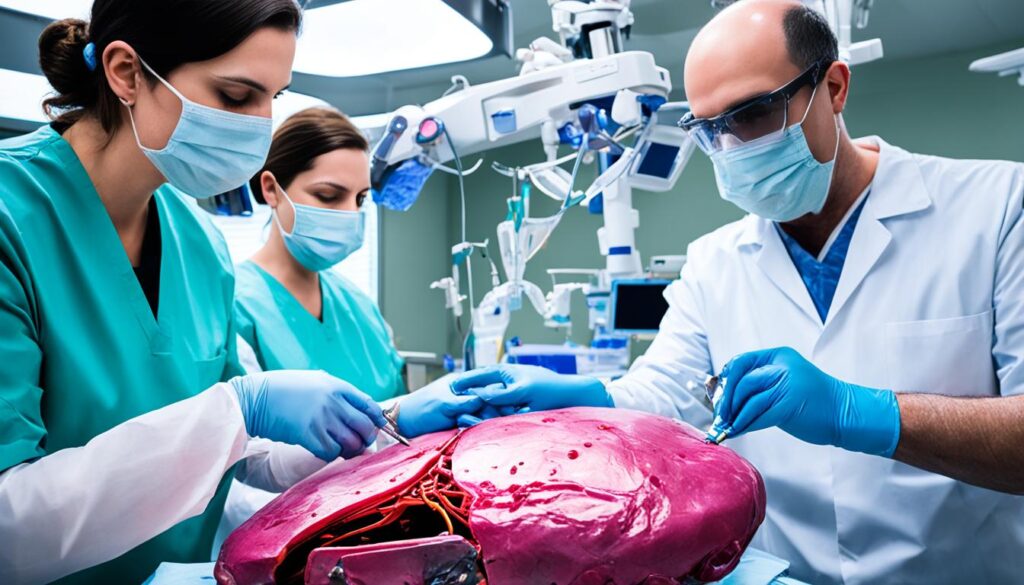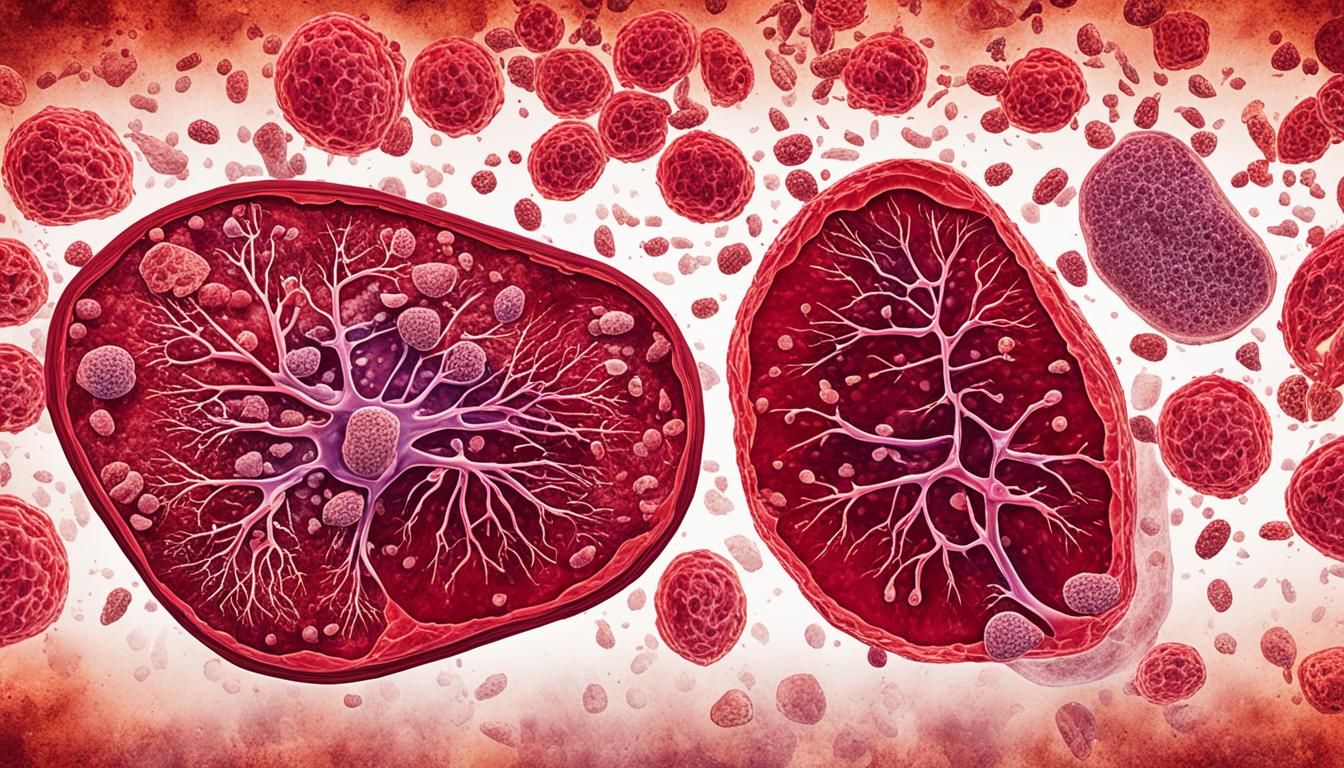Approximately 71 million people worldwide right now have chronic hepatitis C infection. This number shows how big the issue is. It points to the great need for people to know more about this illness.
Hepatitis C is caused by a virus and affects the liver first. It can cause the liver to get inflamed and possibly get damaged over time. If not treated, one big problem that can happen is cirrhosis. This is when healthy liver parts are replaced by scar tissue.
Here, we will look into how cirrhosis and hepatitis C are connected. We’ll talk about the dangers of both and why it’s vital to know and manage these risks. You’ll learn about hepatitis C symptoms, liver fibrosis development, how to treat hepatitis C, and handle cirrhosis and its issues.
Knowing about these liver problems is essential. We’re diving into cirrhosis and hepatitis C to bring awareness to this important health topic.
Key Takeaways:
- Approximately 71 million people globally are living with chronic hepatitis C infection.
- Hepatitis C is a viral infection that primarily affects the liver and can lead to long-term damage if left untreated.
- One of the most serious complications of hepatitis C is the development of cirrhosis, a progressive and irreversible condition.
- Understanding the risks associated with cirrhosis of the liver and hepatitis C is crucial for early detection, prompt treatment, and effective management.
- By staying informed about these conditions and the available treatment options, individuals can take proactive steps to protect their liver health.
Hepatitis C: A Silent Threat to the Liver
Hepatitis C is a global concern, infecting about 71 million people. This virus can seriously harm the liver. If not treated, it can lead to long-term problems.
Knowing the symptoms of hepatitis C is key. Some show clear signs like tiredness, yellow skin, or stomach pain. But many can have the virus without any obvious symptoms.
Regular liver function tests are essential for early hepatitis C detection. These tests check blood for signs of liver damage. Catching problems early allows for timely treatment.
Without treatment, hepatitis C can cause severe harm, like cirrhosis or liver cancer. The virus affects people differently. A person’s immune system and lifestyle can also impact the disease’s progress.
Hep C doesn’t show immediate symptoms or damage the liver at once. Over time, it silently weakens the liver. This can lead to serious health problems.
The Link Between Hepatitis C and Liver Damage
Hepatitis C is a major cause of liver issues around the world. The virus attacks liver cells, causing inflammation. This inflammation can start a scarring process called liver fibrosis.
Liver fibrosis can turn into cirrhosis if not treated. Cirrhosis is a severe liver condition. It can impact the liver’s ability to function, affecting overall health.
“Hepatitis C is a major cause of liver-related mortality and morbidity, contributing to the burden of liver disease worldwide.”
So, understanding hepatitis C’s risk and its liver-damaging potential is crucial. Regular tests and early medical help are key to stop or slow the disease.
Cirrhosis of the Liver: Understanding the Progression
It’s important to know how cirrhosis progresses to manage it well. Cirrhosis is a serious liver disease that causes scarring. It results from long-term liver inflammation, often from too much alcohol, viruses, or fat.
The first step in cirrhosis is liver fibrosis. This is when scar tissue builds up, replacing healthy cells. It happens because of continuous inflammation and injury. Fibrosis makes the liver work less, leading to major health problems.
Inflammation, or hepatitis, harms the liver’s ability to heal over time. This lets fibrosis grow. It’s vital to find and treat what causes the inflammation early. This can stop serious damage to the liver.
“Knowing about liver fibrosis and inflammation helps manage cirrhosis effectively. It can also stop further harm.”
To keep your liver healthy, live well. Eat right, exercise, limit alcohol, and handle any health conditions that cause inflammation. Regular liver checks help spot problems early. This is key for starting treatment soon.
Benefits of Maintaining Liver Health:
- Reduces the risk of liver inflammation
- Promotes liver cell regeneration
- Prevents the development of liver fibrosis
- Preserves overall liver function
- Minimizes the risk of cirrhosis and its complications
Understanding cirrhosis helps people protect their liver. Acting early and sticking to a treatment plan can really help. It makes life better for those living with cirrhosis.
The Link Between Hepatitis C and Cirrhosis
Hepatitis C often leads to a severe condition called cirrhosis. This liver disease can get worse over time. It can cause scar tissue to form in the liver. Let’s look at how hepatitis C and cirrhosis are linked, including when a liver transplant might be needed.
Hepatitis C can harm the liver over time. The liver tries to heal itself, but this causes scar tissue. This scarring can get worse and turn into cirrhosis. Cirrhosis makes the liver work poorly because of all the scarring.
People with hepatitis C face a higher risk of cirrhosis. This risk grows for those with untreated hepatitis C for many years. Studies show that about 20% of those with hepatitis C develop cirrhosis.
The journey from hepatitis C to cirrhosis is slow. As cirrhosis develops, signs like extreme tiredness, yellow skin, stomach pain, and swelling show. Early signs are a cue to see a doctor for more tests and care.
“Untreated hepatitis C can silently cause liver damage, leading to the development of cirrhosis. Regular screening, diagnosis, and treatment for hepatitis C are crucial in order to prevent or slow down the progression to cirrhosis.”
For serious cirrhosis cases where the liver barely works, a transplant might be the only option. A liver transplant swaps a sick liver for a healthy one from a donor. This can save the life of someone with a failing liver.
The choice to get a liver transplant looks at how bad the cirrhosis is, health status, and organ availability. Special centers manage the steps to get a liver transplant.
Not everyone with hepatitis C will end up with cirrhosis. Finding it early and treating it, along with check-ups, can help a lot. If you have hepatitis C or are worried about it, talk to a healthcare provider. They can help with a plan and the best treatment for you.
Hepatitis C Treatment Options
Managing hepatitis C offers several treatments to boost liver health and stop damage. Choices for treatment are:
- Antiviral Medications: Primary treatment involves antiviral drugs. They stop the virus from growing. The newest antiviral drugs are very successful, curing more people and needing less time to work.
- Lifestyle Modifications: Changing your daily habits can help with hepatitis C. It’s key to avoid alcohol and stick to a healthy diet. Also, remember to exercise, sleep well, and manage stress.
- Liver Health Optimization: Keeping your liver healthy is vital. This means checking on your liver often with tests. Also, take your medicine and see your doctor regularly to manage your liver health effectively.
“Effective treatment options for hepatitis C now offer improved outcomes and a higher chance of cure. Antiviral medications, lifestyle modifications, and staying proactive about liver health are key in managing the virus and potentially reversing liver damage.”
Meeting a healthcare provider is critical to choose the best treatment. Your treatment will depend on the virus’s type, liver damage, and overall health.
| Treatment Option | Benefits | Potential Side Effects |
|---|---|---|
| Antiviral Medications | High cure rates, shorter treatment durations | Headache, fatigue, nausea |
| Lifestyle Modifications | Promotes overall liver health | N/A |
| Liver Health Optimization | Regular monitoring of liver function, proactive management | N/A |
Managing Cirrhosis and its Complications
When cirrhosis of the liver shows up, it’s very important to manage it well. Doing so can lower the chance of complications and protect the liver. There are key strategies to help slow cirrhosis down and keep the liver healthier.
Lifestyle Changes
Your lifestyle makes a big difference in cirrhosis care. Changing your diet, exercise, and habits can do a lot for your liver. Here’s what to do:
- Follow a balanced diet that includes a variety of whole grains, lean proteins, fruits, and vegetables to support overall liver health.
- Avoid alcohol completely as it can worsen liver damage and interfere with the effectiveness of medications.
- Manage body weight and maintain a healthy BMI (Body Mass Index) to reduce strain on the liver.
- Exercise regularly to improve blood flow to the liver and promote overall well-being.
- Quit smoking to protect the liver from further harm and reduce the risk of developing complications.
Medications
Your doctor might also prescribe drugs for cirrhosis. These can help with symptoms and complications like:
- Diuretics: These drugs help reduce excess fluid buildup in the body, alleviating symptoms such as swelling and ascites.
- Medications for Hepatic Encephalopathy: Certain drugs can help manage cognitive symptoms associated with liver failure, such as confusion and impaired judgment.
- Antibiotics: If bacterial infections occur due to compromised liver function, antibiotics may be prescribed to treat and prevent further complications.
- Vitamin Supplements: Cirrhosis can lead to nutrient deficiencies, and supplements may be recommended to address these deficiencies and support liver health.
It’s important to take your medications as the doctor says and to keep all your medical appointments. This helps your cirrhosis be managed well.
Other Interventions
Besides lifestyle changes and medications, there are more ways to help with cirrhosis:
- Hepatitis C Treatment: If hepatitis C infection is present, treating and curing the underlying cause of cirrhosis can help slow down its progression and improve liver health.
- Screening for Liver Cancer: Regular screening for liver cancer is recommended for individuals with cirrhosis. Detecting cancer at an early stage increases the chances of successful treatment.
- Endoscopic Interventions: Procedures such as banding and sclerotherapy can help control bleeding from varices (enlarged veins) in the esophagus or stomach.
- Liver Transplant Evaluation: In cases where cirrhosis has reached an advanced stage and complications persist despite other interventions, a liver transplant evaluation may be recommended. A liver transplant can provide a new lease on life for those with end-stage cirrhosis.
Managing cirrhosis means changing your lifestyle, taking medications, and some medical procedures. By being involved in your care and working with your healthcare team, you can make your life better and your future brighter.
Liver Transplantation: A Last Resort
In severe cirrhosis cases, when liver damage is untreatable, a transplant may be the sole option. This surgery swaps a sick liver for a healthy one from a donor. We’ll explore the steps, who can undergo it, and its outcomes for those with severe cirrhosis.
The Process of Liver Transplantation
Liver transplantation involves detailed planning and teamwork. There are several key phases:
- Evaluation: A thorough medical check is done to see if one can get a new liver. This step involves many tests and a team of doctors reviewing the results.
- Waiting for a Donor: After getting on the transplant list, patients wait for a suitable liver. Factors like blood type and how sick one is determine who gets a liver first.
- Surgery: The operation occurs when a matching donor liver is found. The old liver is taken out, and the new one is put in, connecting all necessary parts.
- Recovery and Follow-up: Post-surgery, patients need special care and time to heal. Care continues long-term to check the new liver’s health and watch for problems.
Eligibility Criteria for Liver Transplantation
Not everyone with cirrhosis can have a transplant. Doctors look at how sick the liver is, overall health, and the chance of getting a donor liver. They consider:
- End-Stage Liver Disease: Usually, only those with liver damage that can’t be reversed qualify for a transplant.
- Limited Life Expectancy: They should not live more than one to two years without a new liver.
- Absence of Contraindications: Some illnesses, like drug abuse or certain diseases, could make a transplant risky.
Potential Outcomes of Liver Transplantation
A liver transplant can save a life and greatly improve it. But success depends on the recipient’s health, after-care, and how well they take their medicine.
Although it’s a major life change, transplants are not without risks. These include the body rejecting the new liver, infections, and drug side effects. Close and regular medical monitoring is needed post-surgery to handle these issues.

Conclusion
It’s crucial to know about cirrhosis of the liver and hepatitis C for early detection and treatment. These illnesses can hurt the liver, leading to serious liver disease. In extreme situations, a liver transplant might be needed.
Staying informed and getting checked regularly are important steps. This allows for catching liver problems early. And early action can make treatments more effective.
If someone has cirrhosis or hepatitis C, treatments are available to help. These treatments aim to slow down the diseases and lower liver damage. Changes like a healthy diet and not drinking alcohol are also key.
Sometimes, a liver transplant might be necessary for severe cases. This is a serious procedure but can lead to a better life. Still, it’s best to focus on preventing these diseases and getting help as early as possible.




